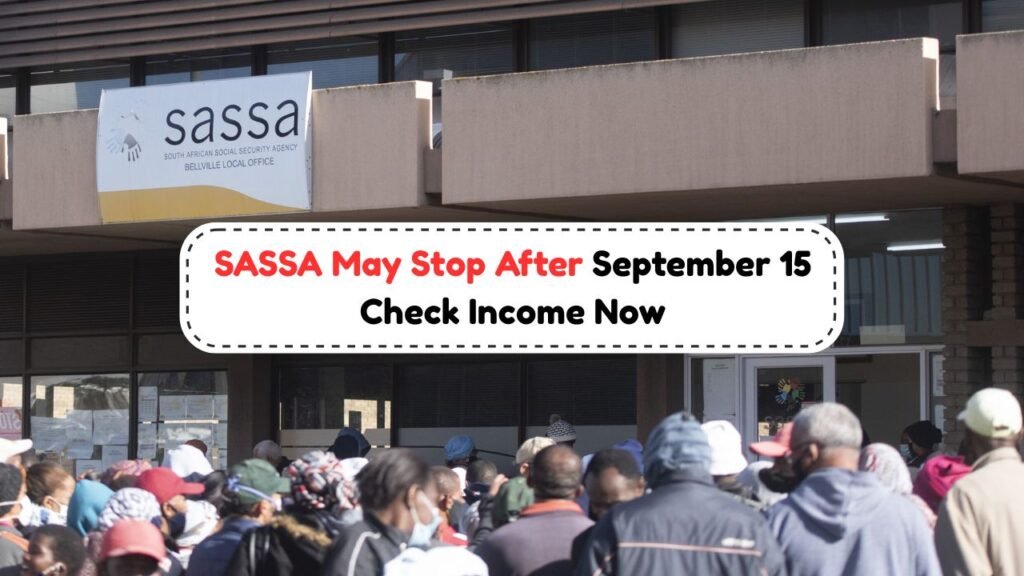SASSA Payments Halted: The South African Social Security Agency (SASSA) has announced the suspension of payments for individuals earning over R8,070. This decision, effective after September 15, has caused a stir among beneficiaries who rely on these funds for daily sustenance. As the government aims to ensure that social assistance reaches those in the most need, the move to halt payments for higher-income beneficiaries is part of a broader strategy to optimize resource allocation. Many affected individuals are now seeking clarity on the criteria used for determining the cut-off income and the implications it may have on their financial stability. The suspension underscores the ongoing efforts to balance social support with fiscal responsibility in South Africa.

Understanding the SASSA Income Limit Policy
The decision to halt SASSA payments for those earning above R8,070 underscores the agency’s commitment to directing funds towards the most vulnerable. The income threshold serves as a critical measure to delineate eligibility and ensure that financial aid is allocated efficiently. This ceiling is set based on extensive socio-economic research, which aims to identify the threshold at which individuals can feasibly support themselves without government assistance. The R8,070 figure reflects current economic conditions, inflation rates, and the cost of living in South Africa. While the policy is designed to preserve resources for those in dire need, it has inevitably sparked debate among those just above the threshold, who may still struggle financially. For many, this change has raised questions about the accuracy and fairness of the income assessment process, urging SASSA to maintain transparency and provide clear communication to affected parties.
Impact on Beneficiaries Earning Over R8,070
The suspension of SASSA payments for individuals earning more than R8,070 is poised to impact a significant number of beneficiaries. Many of these individuals find themselves in a precarious position, as their incomes, while above the threshold, are often insufficient to cover essential living expenses. This sudden cessation of funds could exacerbate financial strain, particularly in households with multiple dependents or high medical expenses. The decision has prompted concerns among civil society organizations and economic analysts who warn of potential increases in poverty and inequality. In response, there are calls for a more nuanced approach that considers the diverse financial realities faced by South Africans. Suggestions include a gradual reduction of benefits or a reassessment of the income cut-off to better reflect the current economic climate. As the dust settles, SASSA’s role in providing a safety net remains crucial, and its policies will need to adapt to the evolving needs of the population.
Government’s Strategy on Social Security
The government’s approach to social security, highlighted by the recent SASSA payment suspension, is rooted in a broader strategy to optimize the distribution of social grants. By reallocating resources from those earning above R8,070 to the most vulnerable, the government aims to ensure that social assistance is both sustainable and effective. This strategy involves rigorous data analysis and continuous monitoring of economic indicators to adjust policies as needed. The overarching goal is to reduce dependency on social grants while empowering individuals through employment and economic opportunities. However, the transition requires careful management to prevent unintended consequences such as increased hardship for borderline cases. Policymakers are tasked with balancing immediate financial relief with long-term economic development, a challenge that requires innovative solutions and collaborative efforts across sectors.
Future of SASSA’s Payment System
Looking ahead, the future of SASSA’s payment system will likely involve further reforms to enhance efficiency and equity. Technological advancements and improved data analytics are set to play a pivotal role in refining eligibility assessments and payment processes. By leveraging these tools, SASSA can better identify individuals in genuine need and streamline service delivery. Additionally, there is potential for integrating social grant systems with other social services, providing a more holistic approach to welfare support. As the agency navigates these changes, maintaining open lines of communication with beneficiaries is essential to build trust and understanding. The evolution of SASSA’s payment system will be closely watched, as it represents a critical component of South Africa’s social safety net, tasked with supporting the most vulnerable while fostering economic resilience.




